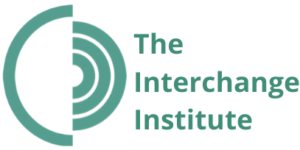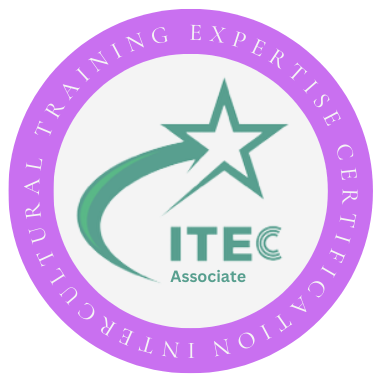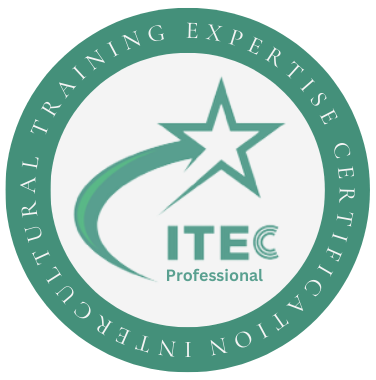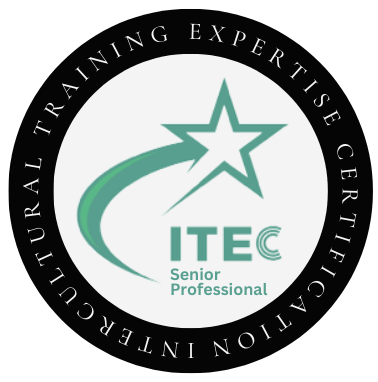Crossing Cultures with Competence (CCwC)

Our Train the Trainer Program
This unique train-the-trainer program is designed for those who are already working with people from other cultures and who want start or continue their journey as an Intercultural Trainer.
This course will enable you to:
- Learn how to apply our industry recognized CCwC toolkit of strategies, techniques, assessment and materials to offer in-depth and culture-specific cross-cultural orientations
- Add cultural skills to your knowledge base
- Supplement your existing cross-cultural training program
- Ease employees’ transition to a new country
- Be licensed to use CCwC materials, receive a certificate of completion and digital badge
- Option to complete an additional assessment and earn your Intercultural Training Expertise Certification (ITEC) Associate to become a certified intercultural trainer
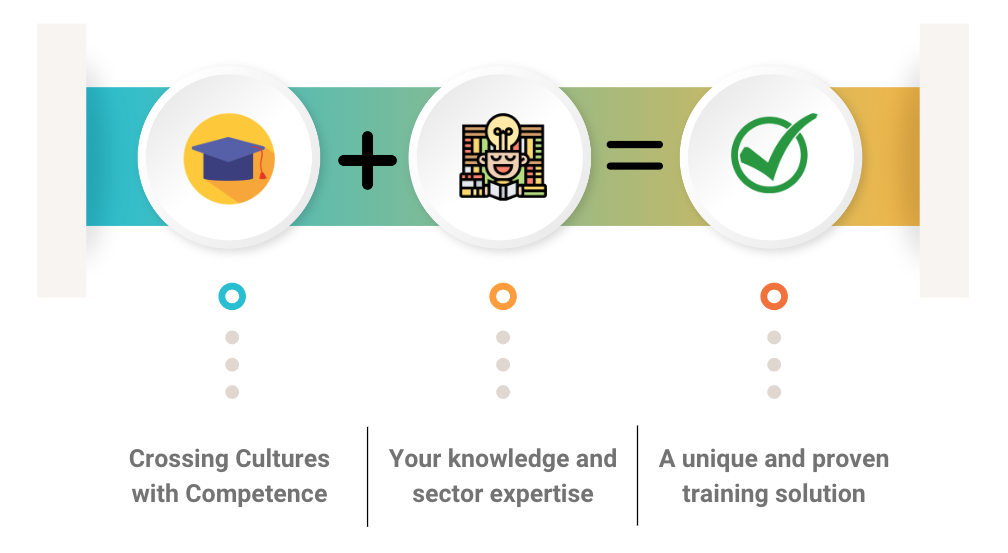
If you are…
- A trainer who wants to add cross-cultural skills to your toolbox
- A human resources professional aiming to ease employee’ transitions to a new country and wanting to keep the training in-house
- A mental health service provider wanting a new way to promote intercultural understanding
- A language, life or professional coach looking for additional services to offer your clients
- An interculturalist who could use a ready-to-go kit to deliver cultural orientations
An educator who works with international students and scholars and their families
…then you’ll find Crossing Cultures with Competence the ideal program. You will learn how to train others to:
- Understand the roots of the cultural differences in their host country, so they can work more productively
- Recognize when they are experiencing culture shock and develop a plan to ease their own transition to a new country
- Learn about their host country’s history, government, economics, demographics and educational and social issues, so they can communicate knowledgeably with host nationals
- Look at their own cultural history and values so they can see how these affect their interactions with others
And much more
During the training, you will:
- Learn the strategies and techniques you need to offer in-depth and culture-specific cross-cultural orientation
- Add cultural skills to your knowledge base
- Supplement your existing cross-cultural training program
- Learn how to ease others’ transition to a new country
- Take advantage of the opportunity to be trained in the cross-cultural field by one of our senior intercultural trainers
You will receive the following:
- A complete kit of materials to offer cultural orientations and cross-cultural training ‘out of the box’
- A detailed trainer guide to lead you through three modules — Host Country Overview, Culture and Communication, and Managing the Transition
- A trainee workbook that you can duplicate in unlimited numbers for future orientations
- Background readings on orientation topics
- 150+ PowerPoint slides to supplement the orientation
- In-depth and carefully researched host country material for the United States – a model you can adapt for other countries using our Host Country Overview Template
- Supervised practice in the use of the materials
- Instructions on how to design cross-cultural orientations for trainees with differing needs, cultural expectations, and learning styles
- Membership in an alumni group of over 600 active Interculturalists’ around the world who have taken the program
- Access to Office Hours with our senior training team
- A certificate of completion and a site license allowing you to use the materials in unlimited numbers in the future
- Digital badge with unique ID for use on social media platforms e.g. Linkedin
We offer the CCwC program via both in-person and online formats so you can choose which is better suited to you.
In-person – delivered over two days in a classroom setting at various locations around the world
Online – curated into manageable two or three-hour sessions, delivered over five days
Check out our events calendar to find the most suitable date and location for you
If all this sounds good to you, or if you have questions, please:
Either complete the contact form or book a discovery call to discuss options further.
Once we both agree that this is a good match for you, we will guide you through the enrolment process.
CCwC online program $1595 USD. Inc of Tax
CCwC in-person $1695 USD. Inc of Tax
Optional ITEC Associate Certification $550 USD. Inc of Tax
(e.g., CCwC online + ITEC $2145, CCwC in-person + ITEC $2245 USD Total. Inc of Tax)
Payment options are available.
If you register 6 weeks prior to the course starting you will receive a $100 Early bird discount.
Discounts are available for two or more people from the same organization attending the training together.
NOTE: Please contact us to confirm registration deadlines.
Added benefits
More than just training - be part
of a community
Completing the CCwC program not only represents an investment in industry-leading training but also grants you membership into a thriving community of over 600 trained interculturalists. This dynamic and growing network provides invaluable opportunities for collaboration, knowledge-sharing, and professional growth.
Recognized
by peers and
industry
Since 1997, we have been training intercultural trainers, and our CCwC program, has garnered an international following and established a robust reputation as the preferred training for many professionals in the industry. Our success is further amplified by our partnerships with leading names in the relocation services sector, who consistently recognize the exceptional quality of our trainers.
Achieve
professional certification
Unlock the path to becoming a certified trainer with the Intercultural Training Expertise Certification (ITEC) – an industry standard for intercultural training professionals. By successfully completing the CCwC program and showcasing your ability to train others through an additional assessment process, you can attain ITEC Associate Status.
